#i love her revenge arc and all of the consequences that come of it
Text
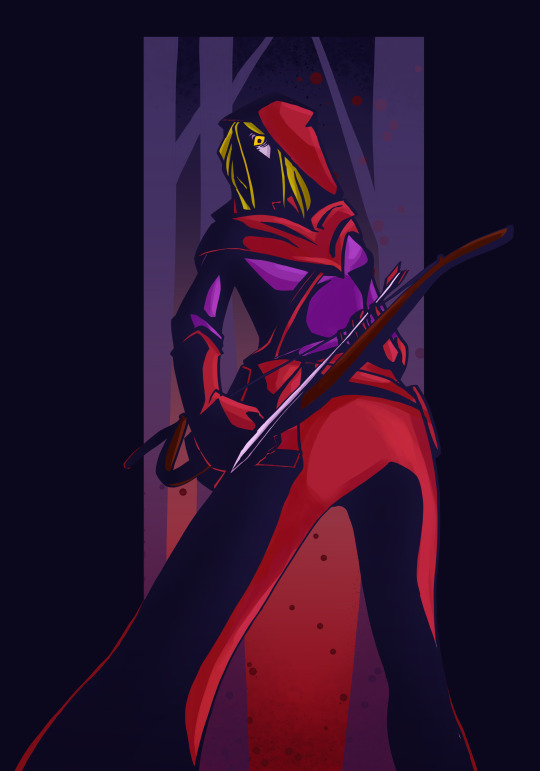
an eye for an eye.....
#arrowette#cissie king jones#young justice#young justice 1998#yj98#dc#dc comics#dc fanart#young just us#arrowfam#POV u fucked up and cissie's got an arrow with ur name on it#rereading yj and reminding myself of how much i love cissie king jones#shes such an interesting character#i love her revenge arc and all of the consequences that come of it#its just so GOOD#but also. i do wish we could have seen a bit more of dark arrowette she looked so so cool#i absolutely love doing big blocky shadows like this it turns out#art#my art#weaverofink
438 notes
·
View notes
Text
Going in circles
There has been a lot of talk about how Gen V is about social media and stage parents but the underlying theme of this season is the cycle of violence that leads to abuse and revenge cycles. It's a positive feedback loop that makes .
Since Gen V is inspired by The Boys comic arc that was a parody of X-Men this is something that was, of course, always staple of X-Men comics/movies/shows. But X-Men stories in their core tend to be optimistic/aspirational. The Boys universe is much more cynical than that. In the end bad guys win or they at least spin their loses their way so they can hold on to power.
Marie, Jordan, Andre and Emma really believed in the ideas sold to them by the marketing team. But the humans they were trying to save were exactly the ones who never treated them to people. Ones who perpetuated the cycles f abuse - from the moment they were given Compound V to all the stages of deciding who is and isn't valuable. They aren't the ones who lead Vought when it all started but they do the same thing again and again because it's profitable. And when it comes to bite them they try to weasel their way out of any responsibility by appealing to the better nature of those who they abused. And so, so many real life abuses seem to use this to escape culpability. Using the "be better than those who wrong you" as the most cynical way to save their own asses.
It doesn't mean that the rest of the non-powered humans don't have a reason to blame supes. Both the Boys and Shetty are not wrong in the assessment that supes always will a leave a trail of blood behind them - both intentional and accidental. From powers manifesting in the disastrous way, through accidents while using them to abuses of power to avoid consequences and finally malice. Supes are human and do exactly the same things but their impact is so much greater and so is their body count. It's gets horrifying because she's not blaming Vought who created this whole problem. Instead she's uses Vought's own torture factory to try her hand at genocide. It's hard to really feel bad about Cardosa and Shetty's death when we just saw them killing some kids in even more horrible way.
Cate was betrayed by every human she trusted. And the worst was that even though Shetty loved her she still drugged her to dampen her powers (those blue pills reference even more clear after latest Matrix movie) and then used her to help with genocide of her own kind. So she gathers all other abused supes and they all go on a rampage because how you can ever trust any one of them if they even corrupt love like that. Being one of "the good ones" didn't really work out. And because this is the time where the ultimate power of Vought propaganda machine lies with a supe it's all swept under the rug by Homelander.
He's done appealing to mudnon-powered people . The one place X-Men doesn't really go in stories like that is the people who go against their own interests because the ideology allows them to feel superior to another group. And they think they'd be spared. It's the voting for Leopards Eating People's Faces Party all over again. Homelander knows now that there are humans who still will follow him (steeped in American exceptionalism and dreams of ubermensch as he is - BTW I don't think it's a coincidence that both Cate and Sam are the kind of Guardians of Godolkin Stormfront would approve of unlike original versions). He just needs supes who think the same as him instead of believing things like non-powered humans are human too. Someone who is not going to bulk at thing he wants to do.
And the boys would do anything to stop him. I'm pretty sure the virus is not out of the picture yet. Between Neumann container and Butcher finding the infected bodies there still might be attempt to use it. After all it's still in pre fully genocidal form. And Marie surviving Homelander's blast may have taught Neumann she might have enough time to pop Homelander's head - especially if he's a bit sick.
In this cycle people who try to stop it are also part of the problem. It too often leads to letting those in power stay in power so the injustices can carry on. Marie uses the system that was designed against her to stop the massacre and it hurts her too. Andre risks brain damage saving helicopter coming to rescue Vought Board. Jordan almost gets overwhelmed and mind controlled protecting them. And Vought will continue doing what they did to babies and any supe they deem faulty product. Believing the heroes will come and save them gets them locked in a doorless room.
We see how appealing to their opponents better nature doesn't work. Maverick cannot break mind control. Sam chose it over conscience. All Emma gets for trying is being made to feel small.
In the end all trying to be heroic got them is being labelled as traitor and scapegoated. And I don't think it's an accident that of this group only Emma is white (although it's nice that the only couple that survived this in neither includes white people nor is straight).
And so the cycle goes. Non-powered humans abuse supes and supes abuse those humans and each sides has a list of atrocities perpetrated on them they use to justify to atrocities they commit. While the people who caused and profit from it this stay in power.
This is even made even more relevant by real life events reminding us about the real, horrible human toll of such cycles hatred. The real excuses that are used to justify violence against innocents by feeding populations a revenge fantasy dressed as justice aren't all that different. And so isn't using it to keep power and gather more assets. But in stories we can hope good guys will eventually win. History teaches us that, in real life, it always ends with those having power behind them getting all the spoils. Everyone can count themselves lucky if they get a half-assed apology too late to count for anything.
#gen v#gen v spoilers#the boys#the boys universe#godolkin university#marie moreau#andre anderson#jordan li#emma meyer#cate dunlap#sam riordan#homelander#vought#gen v season 1#god u
70 notes
·
View notes
Text
On Claudia, Viren, Aaravos & Claudia's Character Arc
This post is mostly about Claudia's character development or should I say character deterioration.
It's highly likely that Callum will be the one to take down Aaravos- like it all goes back to Harrow's letter in s2 and chains of history and the themes of free will vs destiny and such. Aaravos possessing Callum is all about that. He's literally taking control of Callum's faith. There is clear antagonism there that's in a direct conflict with who Callum is.
But at the same time Claudia is the one who's got the biggest personal beef with Aaravos. He exploited her grief, manipulated her and used her father to accomplish his own goals. If Aaravos didn't exist Claudia wouldn't have spent two years of her life in a complete stagnation waiting for her dad to come back from the dead instead of moving on. It seems like Aaravos has been molding Claudia into his personal minion through dark magic during the time skip as well.
Taking this into account it would be really satisfying to see Claudia snap out of it and take her revenge. Characters having a personal connection to the villain always makes a story's climax more gripping. More personal the better! And everything between Aaravos and Claudia is VERY personal.
That's why Viren worked so well as a foil to Callum and Ezran in s 1-3. Especially Ezran whose rightful place as the king he tried to take. He was basically their shitty, power hungry uncle who turned against them. Side note but if Viren is still alive I hope he makes a return as Ezran's foil.
Claudia helping to take down Aaravos would be emotionally satisfying. All the elements for that are already there. Of course Claudia should come to some kind of realisation about the way she's been used by Aaravos before she can take that turn. I doubt the show's got the time for that but it's an interesting possibility to think about.
I really like how the plot around Aaravos manipulating Claudia is done. Even Claudia's own father didn't do anything to prevent it from happening although all the signs of Aaravos having sinister plans for Claudia were there from the beginning: Aaravos calling Claudia "an asset" and encouraging Viren to lie to her in s3 therefore enabling Viren's worst impulses while also using them to his benefit. It's SO EVIL (and I love it). Viren isn't that much better since he always had some kind of excuse to ignore the red flags. At this point of TDP's run I'm convinced that Runaan's "Faith worse than death" line about Aaravos' mirror is finally paying off. It means that the consequences of Viren's actions have hurt Claudia, the only person Viren loves unconditionally, in an unfathomable way.
I think Claudia's arc is relatively subtle and very well done. It balances between Claudia being a victim of manipulation and neglect while also giving her agency to influence the plot as a whole. My only complaint is that Lost Child short story should have been implemented in the show itself and not just be extra material. I have some other grievances but those are mostly fandom related.
How some fans, especially in YouTube reviews, talk about Claudia's downfall like it was inevitable because she's always been fucked up or talking about how "trauma isn't an excuse for bad behaviour" is strange to me. Like, yeah, it isn't an excuse but it's simply just bad media analysis to instantly jump into condemning Claudia's actions, like she's a real person who uses trauma as an excuse to hurt other real people, instead of seeing it in the terms of a character study. Claudia clearly uses trauma to convince herself that what she's doing is right but never tries to manipulate anyone else by using it as an excuse. Think about her and Terry for example: she usually refuses Terry's help instead of trying to garner sympathy from him. This character trait is one of the many reasons why she felt obligated to keep her family together as well. She's extremely stubborn and not very self-conscious about her trauma brain but she does understand why others would see her actions as objectionable. I think this character type (usually a woman) has been given the playful nickname "trauma bitch" in the internet lexicon. Anyway god forbid if we actually empathise, reflect on and engage with unpleasant or problematic characters instead of instantly condemning them.
TDP is about how people can always CHOOSE a different path. Viren's dark magic hallucination in season 5 stated this very clearly.
In Claudia's case it's more interesting to think about WHY she DOESN'T choose differently. That's where all the meat of her character writing lies.
Claudia's arc is what happens when the desperate actions of someone motivated by trauma around abandonment are taken to their logical conclusion in this fantasy setting. It's a fictional story, it has metaphors and shit. Fantasy genre has used necromancy and extending one's life by magical means as a story element to explore humanity's relationship to death many times. The metaphor for loss and regret basically writes itself. Ursula Le Guin has used this trope in The Earthsea books, Peter S. Beagle's The Last Unicorn has done it etc. Everything can't be a one to one comparison to real life (trauma rarely makes you want to kill your friends with dark magic irl. idk that's just me though) and there needs to be a level of abstraction involved in a fantasy story. Abstraction and metaphor, paradoxically, can reveal a greater truth about the world. (I'm probably accidentally quoting someone here but can't remember who.)
Anyway the rest is great. When you think of it all for a moment it's pretty fucked up how Claudia has been used by Aaravos. It's not some tiny part of Caludia's story. It IS her story. And Viren set that norm for her. Viren too has abused Claudia's trust. It's a complex subject and probably requires its own post since Viren, Soren and Claudia's situation reflects some pretty realistic dynamics real life troubled families have. That's why the characters compliment each other's stories so well. Viren is a more realistic character after all when Aaravos is more over the top and symbolic and less of a real person. Aaravos is one of those villains who embodies the opposing ideology of the heros. We (still) don't know almost anything personal about him so he matters mostly in relation to other characters.
Thanks for reading this Claudia propaganda! I've had so many of these in the drafts. Anyway TL;DR
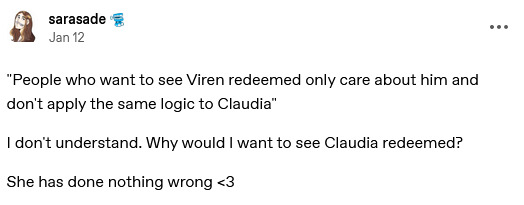
#they did a callback to the unicorn horn spell in s5#rule of threes guys- what if they use the unicorn spell on Aaravos?#like the whole fandom has already figured that Nova Blade is not gonna cut (heh) it#being real salty about TDP YouTube here lol#not to be that person but- is engaging with a complex female character's story really asking too much?#tdp meta#sarasade text#the dragon prince meta#tdp claudia
32 notes
·
View notes
Text
Some incoherent early-morning thoughts about how all the origin companions' character arcs have so, so many parallels. (Major spoilers for the entire game follow.)
All of them have backstories in which they have had power and agency taken from them (Karlach was betrayed as a teenager and made to fight for a decade in someone else's war, Astarion was tortured and made a tool of a horrific vampire lord for two centuries, Shadowheart had her memories of family and faith wiped as a child and was brought up to be a torturer, Lae'zel was a True Believer who was victimized (along with her people) by an undead horror masquerading as a god, Wyll was a teenager who was raised to feel so much personal responsibility for his city that he sold his soul to a devil to protect it, and Gale had his magical virtuosity and religion and love all tangled up in a way that meant he would lose all three when he lost one.
In early Act I, they react differently to their unexpected circumstances, but underlying it all is terror. Karlach is determined to be positive and count her blessings after her escape, but she is terrified at the prospect of having to return to the Hells to survive. Astarion's reaction to finding freedom is largely shock with a nascent joy, but he is terrified of being tracked down by Cazador and made to return. Shadowheart's mission for Shar quickly becomes something that she's less and less sure about, in a way that terrifies her, so she doubles down early in the game and leans into the persona she was molded to. Lae'zel follows a similar arc, in which she has found herself terrified out of her mind to be on an alien planet surrounded by people who don't believe the way she does, so she defaults to the strictest tenets of that belief. Wyll goes through cycles of denial and moroseness about his pact and its consequences, but he's clearly terrified at the mere thought that the ends may not have justified the means. And Gale, of course, understands that the price for his curiosity is this massive destructive force, and he's terrified that he has permanently lost access to many of the driving forces of his life.
The rest of the game gives our heroes the ability to seek power, which generally comes with a revenge component that is revealed to feel deeply futile and unsatisfying. They all have the ability to be saved, in their way, by the people they meet throughout their adventures.
The only power available to Karlach is killing Gortash, but it doesn't change the fact that she's going to die or return to her prison. Her escape is in the connections she's made, in the friends she can bring with her into hell.
Astarion can kill Cazador, but he doesn't feel any measure of true satisfaction over that (which he outright says) - the other option is to double down and Ascend, and the denial involved there warps his personality in a way that parallels early-game Lae'zel and Shadowheart and honestly feels like the start of another character arc a long way down the road. His only escape is to accept living in the shadows, which is made a meaningful life by the connections he makes throughout the game.
Shadowheart can obviously seize power by becoming a Dark Justiciar, but she also has the option to decide to free Nightsong (and later her parents, one way or the other) and defy Shar, and while there are permanent consequences (essentially chronic pain and the knowledge that there may be meddling in her future life out of petty revenge), her connections with the world are also what give that decision meaning.
Lae'zel can remain a believer right up to the point of death, which is reassuring for her need for order and certainty, but even following Orpheus means she shows a lot of the same uncompromising devotion. Eventually, thanks in large part to the connections she makes throughout the game, she sees the importance in protecting people (which is a theme that comes up strongly in her romance), and her ending can reflect that as she flies off to save her people.
Wyll can rather abruptly get his Pact rescinded (with a waiting period, true), but his true tethers and lure of power aren't so much devilish as they are related to the way in which his father has raised him to feel solely responsible for an entire city as a very young man. He's genuine in his love for protecting people, but he has the option to either pursue that love by flinging himself into the political machinations of the city... or, through the connections he makes throughout the game, realizing that he can expand his scope and help others even in Avernus.
Gale can grasp at power and agency by going after the Crown of Karsus. That can either be by giving it to Mystra in a bid for full forgiveness (which she may either accept or decline), or by turning it into the pursuit of his own godhood (and, potentially, an attempt at revenge on Mystra that doesn't end well for him). Through his connections with the party, he can also choose to forego that power and accept his more humble role in the world for what it is.
Honestly, a lot of NPCs also have this "so no one told you life was gonna be this way" arc in which they seem to get everything they wanted but find it hollow and unsatsifying until they reconnect with those around them. Rolan gets the internship with Lorroakan he's willing to risk everything for but is abused in the process, and only through the events of the game truly accepts that his family is what's most important to him. Dame Aylin gets her Wrathful killing of Lorroakan and is terribly shaken by the lack of satisfaction afterwards. And, of course, the Emperor is someone who was given a chance at power and doubled down, out of the belief that only he can set things right because he's just that important (which Shadowheart, Astarion, Gale, and Wyll, among others, can also go through, not to mention Tav). Orpheus trying his damndest to abdicate that power if he survives to endgame is an interesting contrast.
I appreciate a game with a more-or-less coherent set of narrative motifs, and it's even more impressive with the sheer volume of choices that can be made (I've only touched on some of the most common ones!).
29 notes
·
View notes
Note
Hey, Rayllum. Noni here. I just read your post on Rayla and moonfam Coin plot line. It was really good. There's one thing that I'm worried about. It appears that Rayla's family will get some focus in this season. But I've seen a lot of extreme criticism about how the writers seemingly ignore the fact that all four parents caused Rayla so much hurt and loss.
I've seen some people say things such as "Rayla should never forgive them", "that she deserves better parents," demonizing and villainizing them as deadbeat parents. That they are undeserving of sympathy and unworthy of forgiveness.
While I understand and do admit that all four of Rayla's parents are big, massive screw ups who have horribly failed and massively disappointed Rayla as parents, I would imagine them constantly beating themselves up emotionally, enormously hurting and suffocating in their respective, albeit brutal punishments and in some way, paying the price for the actions and choices they've made. Having to suffer the consequences of how regretfully they let Rayla down.
Even if it takes them a very long time, I truly believe they will find a way of mending and repairing their relationship with their daughter. Which is why I believe they'll have an atonement/redemption arc with Rayla and show her how deeply important she is to each of them and how much they truly love her. Whether it's Rayla breaking these cycles on her own or all four parents realizing how their unintentionally hurtful actions, choices, and damaging patterns contributed to her losses and heartbreak thus committing themselves to showing Rayla how terribly wrong they are, I believe they would never waste that chance to make things right with their daughter.
In your honest opinion, what are your thoughts on this?
Love your analysis. Keep up the great work.👍
So this is perhaps my biggest hot take regarding the Moon Fam:
Lain and Tiadrin didn't do anything wrong.
Maybe this is just because I don't have kids, or don't want kids, but I really do not understand the expectation we put on parents (especially mothers) to not have any goals or obligations that are as important to themselves as their children. And parents IRL put things 'above' their children all the time. How often do parents uproot their entire kids' lives for job opportunities? Or, you could argue, even divorce (although that's its own can of worms).
Lain and Tiadrin could've split the time, but even that would be difficult travel and training wise, and they were both asked to come. Who would be their replacement while they were doing a two-week travel exchange back and forth? And while one would be with their daughter, they'd have effectively no time for their marriage. They could've stayed behind, but clearly felt like this was their life's calling - and it's clearly a good thing that they did, given that they were the Dragonguards that made a difference in the end. As Rayla says, "We're here and Zym is alive, all because of them." This is important particularly in the context of Lain and Tiadrin effectively being elite soldiers in a time of Cold, if not borderline outright, war, especially since timeline wise, they probably left 1-2 years after Queen Sarai's death (or less) when Viren, at the very least, was actively chomping at the bit to try and find a way to attack the Storm Spire and take revenge. So there was more than a solid reason to call them into duty to begin with, and reason for them to go, believing this was crucial in maintaining a world where their daughter could live in relative peace
Although it was undeniably difficult for Rayla and she missed them terribly, Lain and Tiadrin 1) maintained Rayla's usual environment in terms of place and culture, 2) in a space where she could be socialized and grow up normally and 3) with loving, caring parents who could devote time to her for an otherwise pretty stable upbringing, barring the initial Bloodmoon Huntress debacle (which - how was anyone supposed to see that coming?)
Then they 'die' doing their duty to the end. One of the reasons I always thought Rayla was so hurt at the thought of them abandoning their post (and while she says she wishes they were dead, she's also very happy to see Callum's drawing of them even before she knows the truth and still thinks they're cowards - the societal expectations and shaming cannot and does not erase her love for them) because it was like "You left me for this, and then you left this too, so how important was I really?" Then she sees it was Incredibly Important to them, and therefore so was she.
Runaan and Ethari meanwhile, are much more complicated.
Now, anyone who knows me knows that I've dragged Runaan and Ethari through the mud for their respective choices (Runaan's behaviour on the battlements and his choice to train Rayla as an assassin in the first place, and Ethari for the Ghosting). I'm also sympathetic and understanding, I like to think, to why they made each decision and the nuance of their perspectives. Runaan, largely, falls into a similar camp that Viren-Claudia-Zubeia (arc 1) do, which is that a world without ongoing war is Unimaginable to him. He passed down his martyr complexes to Rayla, yes, but Bloodmoon Huntress (which makes that passing down explicit) also makes it exceedingly clear that Rayla was already like this. She hadn't had any training or any word from Runaan before her breakdown of "I wasn't strong enough, I wasn't fast enough" or her immense desire to help Suroh; those things, good and bad, were already innate, and led to her making her own choice of becoming an assassin. Runaan then agrees to train her, despite his own doubts concerning the profession for himself (which Ethari reassures him out of, and doesn't that bite all three of them in the ass later, huh?)
Like Rayla begins the show wanting to be an assassin just as badly as Runaan does, and for the exact same reasons, she's just very very bad at it, and quickly defects when she sees there's another way. But it's unsurprising to me that Runaan - who's older, who just got very harshly reminded of Rayla's youth and 'poor judgement' and knows he'll likely pay with his troupe's lives for it - refuses to really listen to her on it, at least as far as the princes go. Why would two humans want to help the son of the creature who killed their mother and is now threatening their father? It doesn't make any sense on paper and outside the context of the story, we, the audience consuming it, know is for children. Much the same way Callum understandably has reservations about Rayla in 1x06 and the boys don't know Rayla hasn't killed / spared Marcos until 1x08 at all in the first place.
Would also not be surprised if Ethari did the Ghosting spell (which, like Rayla, he revokes even before he knows there's a silver lining and that she didn't just seemingly run - which, we see in TTM and in S1 with her lying that Rayla does, routinely, run away from her problems under the guise of running after them) thinking that it was only a matter of time before Rayla's flower sunk, too. There were about 4-5 days in between the rest of the troupe's flowers sinking and then Runaan's, after all.
And again, all of this comes down to harm reduction. Yes, Lain and Tiadrin made imperfect choices in an imperfect world, and yes, Runaan made even worse choices in a decidedly more possibly perfect world, but that doesn't mean they deserve to Suffer in there forever (vs Aaravos whose going through the same isolation, but in a nice cushy prison with books and shit he can control with a wave of his hand). Like being coined is, according to Viren who loves to reduce consequences, canonically worse than death.
So yeah, I think they absolutely deserve to get out. What happens after that, and how much of a relationship they have with Rayla remains to be seen.
However, the idea that the writers are going to ignore how much repair this family needs to do is Absolutely Insane to me. Like just the worst, bad faith, willfully ignorant reading I could imagine. Not only is it judging something that is at least an entire season away (as I'm sure, if they are released in S5, what we'll see is the initial Happiness of the reunion and very little else of a longer aftermath) if not two (S6).
But it's like... the Entire Point of S4, and indeed the arc many characters embark on, is that anger, pain, and hurt are long lasting emotions that don't just go away. Especially when one of the biggest critiques of S4 was that "Rayla left for nothing" when yeah, she did, that was the Point, and she did it - quite clearly if you look at Any of her family dynamics just in the first three seasons - because of her parents. Rayla being able to recognize, more than just "they failed their duty" but that they failed her, that they hurt her, that she's Hurting from everything she's been through since the show started, is crucial in being able to deal with her self worth issues. Like it is the core of her character and absolutely the crux of her development going forward in future seasons. So yeah, pretending otherwise when it comes to her parents is just... Inane and non sensical to me, tbh
Rayla's entire arc going forward, in order to address her emotional needs, is going to be reaffirming that she can make mistakes and be flawed (and fail, like anyone else) and still be worthy of love, protection, and forgiveness. It is the perfect issue and arc to also develop alongside her learning how to adjust and rely on her family again, and in tandem with seeing them change for her in ways they weren't willing or were unable to do so before.
TLDR; the show addressing the Moon fam's failings and personal flaws is something that is crucial to properly addressing Rayla's, which has been confirmed in interviews multiple times by multiple writers to be a plot point in future seasons. Ezran's speech also spells this out to the audience directly to the point it's so on the nose even babies can't miss it: "But… It’s not that easy or simple. Because people are still hurting and they are still angry. We can’t ignore that, or pretend it will go away. Somehow, we have to hold it all in our hearts at the same time. We have to acknowledge the weight of the pain and loss, but open up our eyes and allow ourselves to hope and maybe forgive and love again."
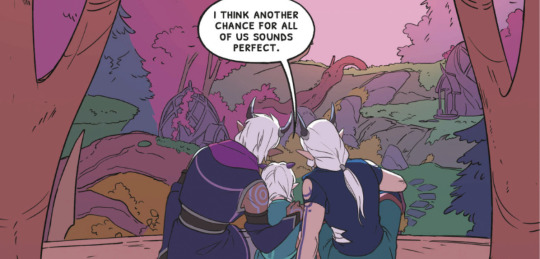
Like it's not subtle. It's happening, lmao
#moon fam#thanks for asking#arc 2#anonymous#mini meta#analysis series#runaan x ethari#requests#laindrin#the show: routinely points out how awful and unfair the Ghosting is#LIKE THERE'S A REASON god ppl read between the lines
47 notes
·
View notes
Note
Donatella and Diavolo for the ask game? (And maybe Squatizi? 🦈)
For Squatizi- I remember the mix of surprise and excitement I felt when I saw the two of them on my first watch of VA. At that point, I had kind of just assumed that Jojo had no actually on-screen LGBT+ characters (The only canonical non-cishet at that point was DIO, whose bisexuality was only confirmed by Araki and is never actually stated or shown in the work) and was simply popular with the community due to its general nature (which does appeal to a lot of gay subcultures and tastes in that way). The notorious Bury-Your-Gays moment with Sorbet and Gelato didn't help either.
So, when Tiziano and Squalo showed up, going so far as to fondle each other on-screen, I just went "holy shit". These two are actually gay? And we get to see it? Honestly, I cared less about the fight in that arc and was just interested in seeing what would be done with those two- I suppose it wasn't explicitly stated they were together, but the on-screen groping was kind of enough to tip you off. Just for that reason, I do have a fondness for them, and I do understand why people love them and mess around with them so much in fanon.
Though, while the novelty of an actual gay couple in Jojo excites me alone, much of their writing still frustrates me and they were far from what I'd consider "good representation". They had very little screentime and were really less two individual characters and more just two halves of one whole. The fight itself was underwhelming (which you articulated perfectly in a previous post of yours) and Squalo dying almost instantly after Tiziano instead of putting up any sort of fight after his mantra of revenge was disappointing. While "good representation" is not exactly my expectation knowing... the way Jojo is, it was still annoying.
I do like them and enjoy how people take their characters and expand upon the underwhelming amount that canon gives. They're not my favorite couple and I don't talk about them a lot, but I certainly favor the pairing and see why people focus on them so much.
As for Diavolo and Donatella: As you might've guessed, I have many thoughts about the two of them. I don't know how long this is going to be, so I'll put this under a cut.
I would not say I think about Donatella and Diavolo as a pairing in a particularly "shippy" way. In a lot of ways, I don't even really see them as a romance. They only interacted for an extremely short period of time, at about a few weeks maximum, and despite apparently growing attached enough to sleep together, they barely found out anything about each other and Diavolo abandoned her without so much as giving her his name.
I find Donatella incredibly interesting (and frustrating) to think about just for that reason. Diavolo is obviously extremely avoidant of people and has been so for his entire life, using aliases since he was young, killing his mother and burying her under his house's floorboards, and then killing his adoptive father and burning down his town when he found out. In all other ways, he shows dangerous precision, determination, and intelligence when it comes to erasing himself from the world.
So, on one hand, Donatella is a really interesting deviance in his behavior and a representation of the moral of Diavolo's character. Connecting and being known by other people is simply a part of being human; Diavolo tries his hardest to scrub every trace of his existence away and isolate himself in the search of evading the inevitable pitfalls of being human, but this is an impossible task. Even one little connection from years ago- in this case, a brief fling- spiralled into an unignorable marker of his existence, and that led to his downfall.
For anyone else, a brief date as a teenager would hardly be anything remarkable or consequential, but for Diavolo, his goal to erase himself completely just multiplies the consequences of any and all relationships he's had. What would likely be a connection anyone else would overlook is instead the main reason for the fall of Diavolo's empire. (You also have the fact that Diavolo was apparently irresponsible enough to get Donatella pregnant, which could say something about how Diavolo's avoidance of relationships makes him act haphazardly and make big mistakes in the relationships he did have.)
However, at the same time, Donatella is... odd to think about (and I believe this is also part of why she's talked about as little as possible in the story). It's very hard for me to imagine Diavolo, someone shown to be secretive since he was very young, having a fling with a random girl out of nowhere. Sure, him having a relationship could work, but a seemingly random brief date leading to an accident-baby just seems off and hard to imagine considering everything else we know about him. Believably expanding upon the idea with more detail while keeping Diavolo in character sounds rather difficult, which is why I think Vento Aureo just doesn't bother doing it. (Also, why would someone date and then sleep with a guy whose name they don't even know?)
Not to mention, throughout the entire story, in all of Diavolo's spiels about how the past is coming back to haunt him, I do not believe he ever even says Donatella's name. Trish only mentions her once when prompted in the Notorious B.I.G. arc, and the only information she gives about her father are the basic facts that he was Sardinian and briefly dated her mother as a teenager. We learn essentially nothing about the relationship that these two had to Donatella, and that's a big problem.
Diavolo is at least built to be mysterious, but Trish... isn't. Could she not have asked Donatella about what her father was like personality-wise during any point in her life? Did she have no opinion on what she was like as a mother? Did she garner no opinion on her father before it was revealed he was a crime boss?
While I can speculate, it's obvious to me that Donatella pretty much only exists in the story as a plot reason why Diavolo has a daughter and not much thought was put into her or this detail of Diavolo's past beyond that. I think it's equally hard for others to envision this, which is part of the reason why the misconception of Trish actually being Doppio's daughter is a thing; the anime even plays into this by expanding on their backstory to have Doppio be the one to meet Donatella instead.

However, as I've said before, we know that this isn't true and this anime addition is in fact kind of a plot hole. We see that Doppio doesn't recognize Donatella, being unreactive when holding a picture of her in both the manga and anime and laughing at the concept of having a daughter or a girlfriend.
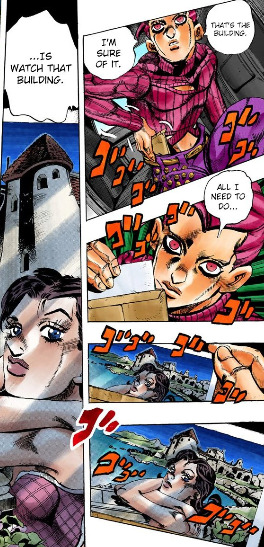
This anime change is especially irritating considering the fact that there are other implications in how Donatella apparently knew Diavolo and not Doppio. According to their backstory in the manga, the described personality that their adoptive father and village came to know them as is "cowardly and clumsy, yet open-hearted"- describing Doppio to a T.
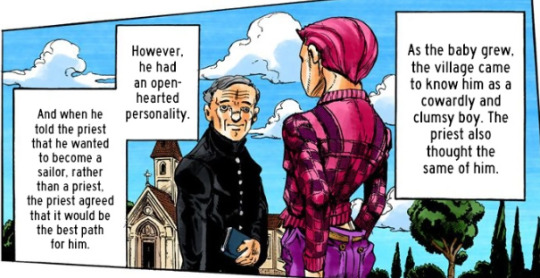
For clarification, the manga goes on to state that in the Jojo universe, people with DID have alters that are fully present since adolescence.
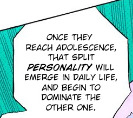
This suggests that both Diavolo and Doppio were around since early childhood, but the village people and his father only knew Doppio- which makes sense, because knowing Diavolo, he would probably keep to himself. So, then, the fact that Donatella apparently knew Diavolo and Doppio doesn't even recognize her would say something really interesting about their relationship alone; what made Diavolo comfortable enough to show himself to her? What prompted him to go out and meet her in the first place?
Also, this may be a bit of a tangent, but I really dislike how they attempt to characterize Donatella in the anime. Her dialogue comes across as extremely stilted and odd, which makes sense, considering it's just her repeating the list of Trish's interests in the manga. (Literally- rewatch the scene and compare it to the page.)
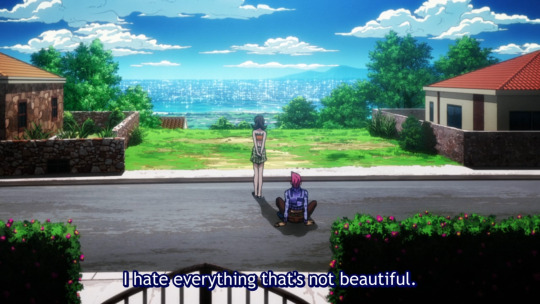
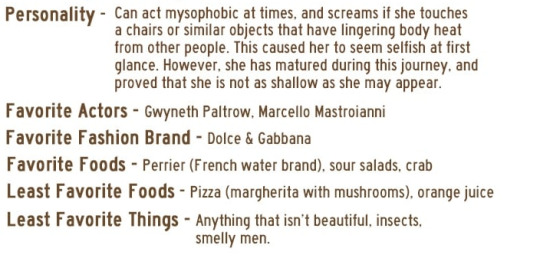
Unlike Trish, she gets no characterization beyond this "I love sparkling water and I hate smelly men and anything that isn't beautiful" spiel- honestly, she somehow comes off as more shallowly written than the grand total of zero lines she got in the manga... but I digress.
Diavolo and Donatella are really interesting to me, but the information we get about them in canon is almost less than bare-bones, which I find to be one of the major flaws in the story. (Seriously, Jojo's creation of really interesting implications about characters and then simply refusing to do anything with them is one of its most annoying tendencies, and it especially shows with Diavolo.) I do enjoy people attempting to expand upon them in fanworks with the very little we get, but I don't know if I'd call that "shipping"; just expanding upon a hinted relationship. All in all, it's a pairing with a lot of food for thought.
#sorry this took very long to answer- i got really busy for the past few days and couldn't be on tumblr much#ask game#asks#shoe talks a lot#squatizi#vento aureo#diadona#haven't read Testimone di Gangster yet- i promise i'll get to that. I'm just busy + have a very long reading list atm
18 notes
·
View notes
Text
like honestly the thing i dislike most about tlou2 is how it treats ellie’s character arc and response to her trauma and i think that the parallels that the showrunners have drawn between her and david in the show are explicit proof that they genuinely do not have any ability to differentiate between different forms of violence and the ways in which they can be justified. there is no question that all of the violence ellie takes against david and his crew is retaliatory and done out of necessity, or done because if she didn’t hurt them first they would have hurt her. she is a 14 year old in a cruel world with someone she cares about to protect, and everyone else in this world is fighting to keep their lives on the day-to-day just like her. the violence she chooses to take is not just a consequence of the world that she lives in but a requirement in order to stay alive. and she doesn’t take pleasure in this violence! she never kills or hurts anyone out of enjoyment or sadism, she kills them because she fucking has to. and yet when david, the rapist and predator, accuses her of having a “violent heart” for daring to fight back against a gang of adult men trying to kill her, the showrunners state that he’s supposed to be exposing an uncomfortable truth and that his words ring true in some way. they fucking don’t! a child defending herself is not comparable at all to the adult preying upon her, but because she’s using violent means to do so she’s treated like she’s just as bad as them. and this is why i think that the way tlou2 frames ellie is just fucking shitty, because in that story as well the violence she takes is not founded from a simple desire for pleasure or gratification. it comes from a lifetime of watching her loved ones die, of being reminded time and time again that everything can and will be taken from her and she has no choice but to sit and watch. her violence is an attempt to reclaim what’s been taken from her after the person she loves most has been killed and she’s been pushed over the edge. the story ends with her having everything taken for her and ending up alone because she’s sacrificed everything for the sake of pursuing violence, and while this makes sense with the theme it’s completely incongruous with her character because that’s the issue she has been facing throughout the entire series! she only ends up stagnating as a character because her violence is not taken into the greater context of her development. this issue is also present in the attempt to compare her character to abby’s because they have very different reasons for pursuing violence but they’re treated the same by the story. ellie’s story revolves around revenge, but although abby’s story starts with revenge it ends up with her learning that thoughtless violence is bad and compassion is valuable. abby is rewarded by the story because she’s able to learn that violence is bad and move on from that while ellie is punished because she never moves on. but ellie was never at a point at which she was joyfully killing people and taking pleasure in their torture! she doesn’t have the opportunity to learn from her violence because her priority never was simply to kill people for the sake of it, it was to secure closure for the damage she’s sustained. the only reason abby even is able to move on is because her revenge plot succeeds and it brings her closure. the way that the story continually treats violence like a universal constant and the source of all the characters’ problems, instead of taking the time to evaluate the reasons that motivate this violence, is so deeply frustrating. victims are treated just as bad as their abusers for fighting back because the issue is perceived to be the violence and not the beliefs or power dynamics behind it. just. ugh
#anti tlou2#take a shot every time i say violence in this post#this post is very long and rant-y and also not that well written but i decided to be a haterrr :3
28 notes
·
View notes
Note
The reaction to Allison has been interesting ,(and mildly infuriating) I've seen so many people saying "obviously" this was setting her up as the big bad villian of S4 which I don't see at all.
I think it comes from a few different things:-
1) people saying they want morally ambiguous/dysfunctional characters but in reality don't unless it's 'pretty' or angsty or something people can easily project on to. I assume there has to be a big difference in demographic for TUA Vs say, The Boys which is full of reprehensible people but the audience expect it. We've seen The umbrellas kill people as kids , I don't think their morality is the same of everyone elses.
2) there are two things I think from a writing perspective probably should have been done differently a) the Luther rumour scene -it brings back the romance subplot that people hated and couldn't even accept as an example of how their childhood fucked them all up, and well, it's hard to redeem SA. Probably should have been cut.
b) there's a certain point in S3 where all Allisons dialogue becomes almost entirely angry/snarky which has lead to a large influx of 'omg Allison is such a bitch!!!!!' I wish there was a late in the series convo with someone neutral like Klaus to give the character a moment to breathe.
3) Lack of sympathy for the character bc we've seen very little of Allison's life pre S1 and in childhood. I've seen loads of people say that she has had a basically cushy life due to her powers, and I think sooo many of the audience believe if they had her powers it would be all sunshine and rainbows. We got multiple flashbacks for Klaus this season (which I loved) but I really think Allison would benefit from some.
4) good old racism and misogyny. I reaaaaallly wanna know what the reaction would have been if Klaus killed Harlan for revenge for the moms or some shit.
Whew, this is all very true. People want traumatized/morally grey characters as long as they're sexy about it (see: Spike from Buffy, who took the SA way further and was still probably the most popular character). It's still bizarre for people to have watched the second season and say she's never had to work for anything.
I also think it's the target, though. Being mean to Viktor is kind of treated like the ultimate sin. People act like he's a little kid. So we get an angry black woman (already stigmatized as fuck) screaming at a small white person people essentially see as a child and go "I understand why she's angry, but she's crossing a line by being mean about it." She's talking to someone who destroyed her life twice. Does she owe it to him to be nice about what he has done to her, sometimes intentionally? Don't get me wrong, their fight was fucked up and Allison said some fucked-up shit, but the issue of the audience's reaction to Allison this season is multi-faceted--and it is an issue.
We needed more of her perspective. Fuck, we needed that scene with Klaus or someone where she says she doesn't get why everyone's so keen on dying and letting everyone else die with them. Put that between the vote and Reg killing Luther and Klaus could help her come to terms with death by talking about what awaits them on the other side. She could start looking forward to seeing Ray again when they hear a scream from down the hall...
...Apparently I have a fanfic to write.
But for real, I don't think Allison's arc will feel satisfying until next season. I think there will be big consequences for her, as many as there were benefits for her this season, and I hope they will come after she has calmed down and is ready to make peace with everyone. That's not even getting into what Harlan could have meant when he said her vibration sounded "wrong" (something to do with her self-rumor, maybe?).
#tua meta#the umbrella academy#allison hargreeves#viktor hargreeves#klaus hargreeves#five hargreeves#ask answered
92 notes
·
View notes
Text
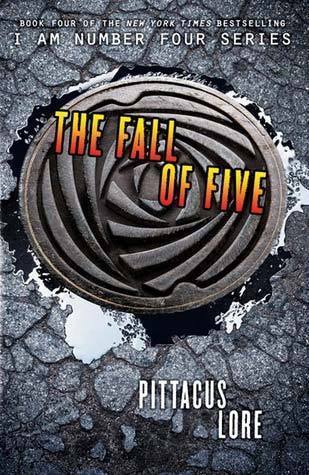



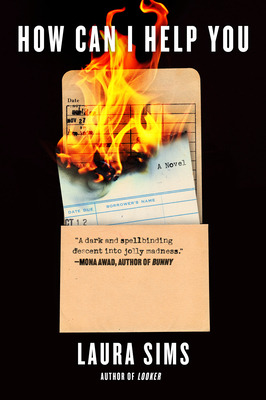

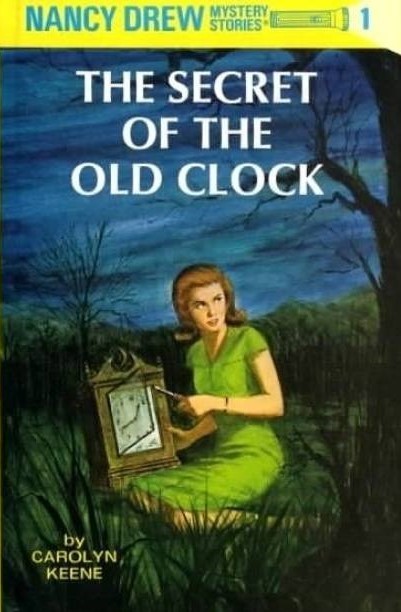

REVIEWS OF THE WEEK!
Books I’ve read so far in 2023!
Friend me on Goodreads here to follow my more up to date reading journey for the year!
___
164. The Fall of Five by Pittacus Lore--⭐️⭐️⭐️⭐️
This series continues to be addicting. Even though I had a gazillion other library books to read, I was always thinking about this one and how much I wanted to read it. With the title of the next book being an obvious revenge story, I knew this one was going to punch me right in the feels.
I was right and oh man, my heart.
I knew something was off with this one and its characters. Some things were just too coincidental for them to not lead up to a wild twist and cliffhanger, and just like the past books, this delivered. I would say this one is the most emotional one of the lot (for now) and the most complex one. We're starting to deal with the even greater consequences of the war these kids are fighting and how dirty war itself can be. I foresee this book and its heartbreaking ending being the story that will tip this series into overdrive. I absolutely can't wait to read the next book.
One star off because I have read about the dirty origins of this series.
___
165. I Survived the Japanese Tsunami by Lauren Tarshis--⭐️⭐️⭐️
While I still think these books are amazing for younger readers, I find that some of them are a lot simpler than others. I don't know why this one felt like one of those stories that just flew by and I didn't really catalogue what I was reading.
I remember seeing the news stories about the tsunami as it hit and the aftereffects of the tragedy as the days, weeks, and months passed. I don't know what I was expected from this, but I kind of wanted more? It felt like I blinked and the book was done, aha.
But with that being said, I AM glad this was written! I think kids should be reading these books, if not for the adventures of these fictional kids growing up, but to learn more empathy for these young survivors!
___
166. The Twenty-Three by Linwood Barclay--⭐️⭐️⭐️⭐️⭐️
Chaos. Absolute chaos.
This book was unputdownable from the moment I started it to the moment it ended. This was the book I was waiting to get to in this series because it was the eventual meet-up of everything that had happened in books one and two. All of those little clues, red herrings, and cliffhangers led to this book and I was 100% here for it.
I can't say too much because I don't want to spoil anything, but I loved the twists in this and surprises. I never expected that person to be the 23 killer and it was perfectly executed.
If Barclay ever writes in this town again, I will devour it. I read book four first and I'm kind of glad I did because it felt like a wholly new series. If you love a good mystery that spans three books, but also a series that always has something going on until the very end, then you might like this one!
One of the things I love about Barclay's writing is that he introduces all of these characters and situations and when they all meet at the end, you never would have guessed how those characters connected. I can't wait to read more books like this from him.
___
167. The Final Gambit by Jennifer Lynn Barnes--⭐️⭐️⭐️⭐️
A solid conclusion to the initial trilogy arc!
Such a smart conclusion and I can totally understand the hype behind this now. We learned a lot more about the characters in this one and what makes them click. We also get to see the MC come fully into her own to the point where anyone might mistake her for a Hawthorne.
I'm glad I got to read these with the next one out already because I'm so curious about what the MC proposes in the epilogue!
___
168. How Can I Help You by Laura Sims--⭐️⭐️⭐️
I was unsure about this book from the beginning. To the point where I read the mixed reviews to see whether I should DNF the book or not. While I don't regret not DNFing, I also feel meh about it all.
I think it was interesting reading the story from the perspective of someone who was clearly a murderer but saw herself as more of an angel of death-type (like the kind who think they're doing a kindness in killing their patients). I also enjoyed watching her mental collapse as she became more and more paranoid if the new staff member.
A staff member that I, to be honest, was a bit confused by. Only because she was so enthralled by this killer, but I guess there ARE those out there who are heavily intrigued by the dark deeds of others, especially if those histories tend to help that person's personal goals.
Both characters were incredibly unreliable and unlikeable. The conclusion, while fitting, I found to be a bit too quick. One moment one thing was happening and then the next, all things fell down. I do wish there was more to it. One of the things I did like about this book was the cat and mouse type of mood this book set and I found that was squashed at the end.
Read this if you love librarian settings in books that feature morally grey characters with a penchant for death. Overall, though, be aware that (for me) this was a bit of a meh read.
___
169. I Survived the Attack of the Grizzlies, 1967 by Lauren Tarshis--⭐️⭐️⭐️⭐️
I really enjoyed this one!
I had no idea about the events of 1967 and I'm glad that I got to learn more about it. I also liked the focus on the dangers of polluting and leaving the forest the way you left it--without any of your garbage left behind.
Much like many of the other books in this series, the MC is dealing with the grief of losing a parent. This storyline is weaved into the tale of the strangely behaving bears. In a way, it was an extra layer of distress that the young mc had to overcome. So, while the reader can learn a bit about history, the importance of taking care of the environment, and the internal turmoil that can come when grieving the lost of someone important to you. For that latter bit alone, I wish these were around when I was a kid.
Highly recommend this one, it's probably one of my favourites of this series.
___
170. The Secret of the Old Clock by Carolyn Keene--⭐️⭐️⭐️
This isn't my first NANCY DREW book, so I kind of knew what to expect. It was a simple and fun mystery, but I was also a little bored? Maybe I need to read more of the books in this series. Especially since I know that this is just the beginning.
I DID love the sass that Nancy experienced and how she fought back against it. The conclusion to this book was also satisfying, especially after all of the strife the characters experienced.
Also, in a weird way, this was an interesting view into the time of when this book was published. Will definitely read more.
___
171. The Brothers Hawthorne by Jennifer Lynn Barnes--⭐️⭐️⭐️⭐️
I received a copy from the publisher for an interview with the publisher on Indigo's Instagram. This did not affect my rating in any way.
I really enjoyed the initial trilogy of this series and was surprised to read that this one was from the perspective of two of the brothers, rather than still from Avery's POV. I really enjoyed the change because it allowed me to see the world through their eyes. It also, to me, made the storyline feel more complete, now that we have a more rounded insight into how the boys think when faced with puzzles and riddles.
I loved meeting some of the new characters in this one and how they played into the overarching story. Some added humour to the story, and other just showcased how they were truly related to one of the boys. I also really enjoyed being able to see the relationship between Avery and the brother she chooses, I think it'll be a great exploration of her choice for those who might have not agreed by the end of THE FINAL GAMBIT.
I'm excited to see how this all plays out, since this appears to be a new arc for these characters!
___
Have you read any of these books? Let me know your thoughts!
___
Happy reading!
#Reviews#Review#book review#Features#on books#on reading#book blog#book blogger#my writing#my opinions#book list#read#reader#reading#book addict#booklr#bookish#books#bookworm#bookaholic#booklover#book life#readers of tumblr
7 notes
·
View notes
Text
Connections to Kristof's Book of Lies #3 (Migi & Dali Observation)
Click here to return to the top of this thread.
The Sali arc was undoubtedly one of the most significant arcs of Migi & Dali as it served as a major wedge between the twins.
While Dali was focused on revenge, Migi was able to fall in love and even have his first girlfriend (albeit his brother in disguise).


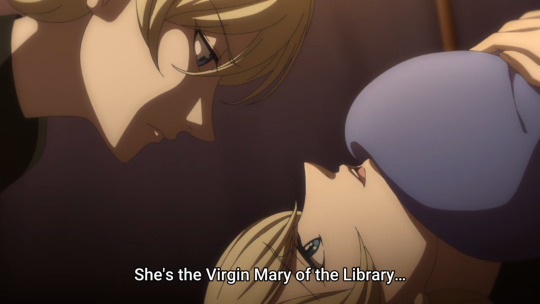
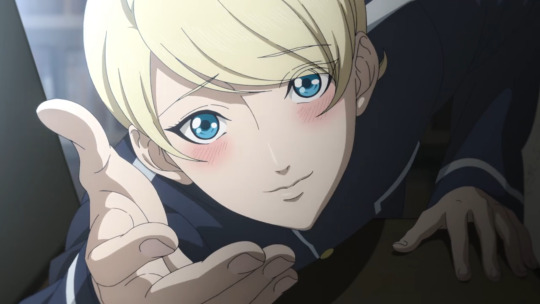

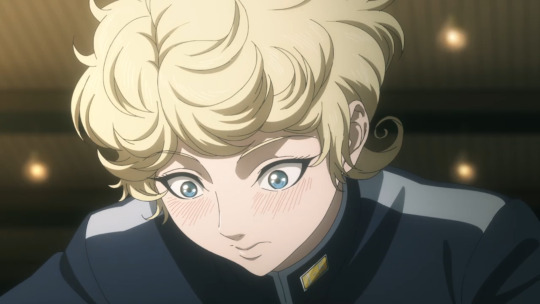
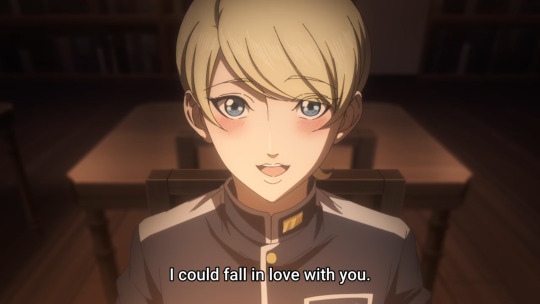


I do feel bad putting these up, since I have to relive the pain of seeing poor, innocent Migi getting taken advantage of.
Indeed, because Dali insisted on continuing this lie, this had disastrous consequences, as Migi also experienced his first heartbreak and betrayal, which completely destroyed his heart and caused him to turn against the brother that he loved more than anyone.
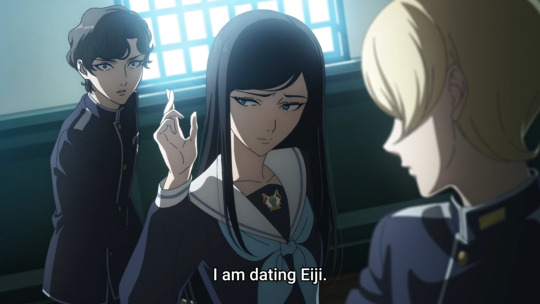
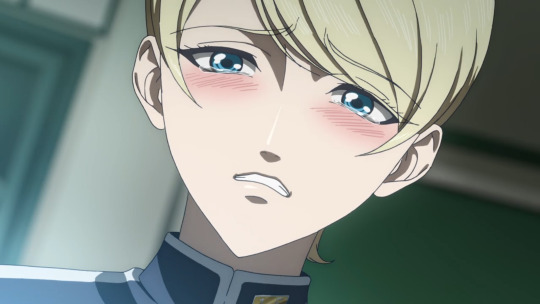

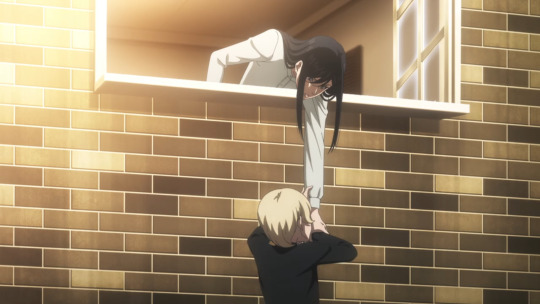
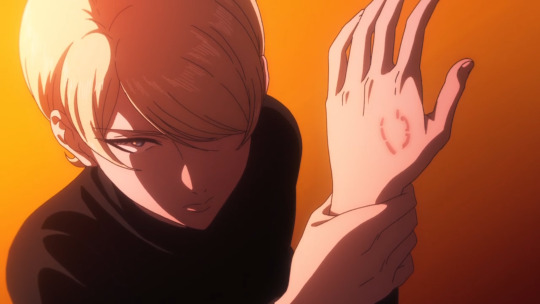
There is a rather interesting parallel between Sali and the housekeeper in The Notebook.
In the chapter titled "The Priest's Housekeeper", the twins meet the priest's new housekeeper, a beautiful and young blonde woman who was not only kind to the twins, but also did something that made them fall in love with her.
Note: I won't say what it is because it is a bit too vulgar for this blog; you'll have to read the book for yourself to find out. I'll just say that it is even dirtier and more disturbing than Migi's "sweet treasure".
Anyway, the twins grow attached to the housekeeper and even follow her around as her proteges, most likely seeking her affection. They bathe and cut their hair and nails every Saturday because she wants them to be clean, and they often eat bread and butter together with her.
She's probably the closest thing to a maternal figure for the twins, and their fondness and innocent love for the housekeeper is very similar to Migi's love for Sali. After all, Migi noted that Sali had the same eyes as his mother, and Migi was willing to do anything for Sali.
However, the twins in The Notebook come to find out that the housekeeper is not as sweet as they thought.
She had relations with multiple men, but this was not enough to stop the twins from seeing her, similar to Migi's persistent love for Sali even after she starts dating Eiji.
But in the chapter titled "The Human Herd", the twins' image of the sweet and beautiful housekeeper is completely shattered when they witness her committing an act of cruelty towards the weak, which she called "animals". This is similar to when Migi had realized Dali's betrayal, completely shattering his image of both Sali and Dali.
The twins in The Notebook likely realized that the housekeeper didn't actually love them and was only keeping them around for her own amusement, and as a result they attempted to kill her by laying an explosive trap so that they would never see her again. This is similar to how Migi ran away from Dali after confirming the betrayal, probably feeling that Dali didn't actually love him (which wasn't true).
In both stories, it was shown that chasing after love can be very tempting, especially for those who have never experienced much love before, but it can also be disastrous, as reality can often be cruel, and the love could very well be an illusion. Thus, by creating a story arc very similar to the housekeeper arc in The Notebook, Sano was able to highlight how Dali's obsession with revenge and his manipulativeness towards Migi ultimately destroyed Migi's innocence, made Migi disillusioned with love, twisted Migi's perception of Dali, and almost destroyed the bond that they shared.
2 notes
·
View notes
Text
Lore Post: The Goddess of Life and Fates
As chapters for Passion draw to a close, I'll be posting for Bittersweet Future over the course of the year. There will be a couple chapters posted in March, and then the third arc will be posted all throughout summer.
This particular Goddess, and her themes, are the driving force behind the entire series, and I think it's time I introduced her.
The Goddess of Life and Fates, Snímaid is the least regarded of the Major Divine among ghosts. Though the weaver of Fates controls the lives of all those within the Timestream, most ghosts believe her powers extend only to the still Living World.
As a consequence, she's most often besought by the recently deceased looking to safeguard their loved ones or enact revenge against their foes (prayers of vengeance are split between her and Aodh). She's also subject to the occasional prayer by those wishing to change their fortunes, and the most likely to regard and worship her in the Zone are gamblers. This leaves her with few areas of worship, with offerings often given at the temples dedicated to the entire Major Divine and the area altar in casinos and gambling dens. She also has no major festivals or holy days on the calendar in the Local Zone, with her largest celebration taking place during a festival celebrating the craft of weaving itself in Kingdom Drazi.
In truth, the Goddess' powers supersede almost every other in the Pantheon, and relatedly she possesses an army of Servants, acolytes, and temple workers to see her will completed. The most important of these are The Observants and Clockwork, the latter of whom is her major physical Incarnation in the Ghost Zone.
While another of the divine, her sister Brinnglóid, rules Portents, Prophecy, and Messages, all visions of the future ultimately come from reading her Tapestry Of Life.
Snímaid is not her true name, but instead a version hinting at her nature as known by some of the timebound beings on this world.
Her fellow Divine, and some of the Aspects of Creation themselves, don't fall under her purview, though these creatures are far and few between.
Her main servants, beings tasked with seeing her Divine Will completed in the material plane, are blessed with the ability to see life, in all its many varied paths and forms, or even "bend" fate.
#danny phantom#Lore#ghost zone lore#ghost zone religion#ghost zone culture#balshumet's fanfiction#balshumet's baragouin#Balshumet's Lore#danny phantom fanfiction#Goddess of Fate#Goddess of Life#The Weaver of Fates#is one of the most powerful of the Divine#in an absolute sense#and she gets no respect from the timebound lol#She won't be showing up for a VERY long time#but know that she haunts the narrative#in the BSF series
2 notes
·
View notes
Text
He Who Drowned the World review

5/5 stars
Recommended if you like: fantasy, historical fantasy, Chinese fantasy, LGBTQ+ characters, morally gray characters
She Who Became the Sun review
Big thanks to Netgalley, Tor, and the author for an ARC in exchange for an honest review!
TW: SA, rape
I'm always a little wary when I go into sequels of books that were really, really fantastic, but this one 100% lived up to expectations. The characters are in the midst of the effects/consequences of the end of the last book, and they grow and change throughout this one, but every one of them brings so much to this book. It's a fantastic follow up to She Who Became the Sun.
The plot feels very high stakes, and while there are parts where things are a bit quieter, you can still really feel that throughout the book. There's a lot of strategizing and re-strategizing and risk taking, which I enjoyed, and there's a palpable feeling of all these characters being so close to what they've been striving so hard for. This book is also definitely darker than the previous one (and there's also a lot more sex).
Zhu continues to pursue her dreams of greatness and builds on her victories from the previous book. naming herself the Radiant King seems to have stabilized some of her ruthlessness, but that streak is still in her and you can see it in how she strategizes and plans. I loved seeing Zhu's growth in this book as she gets closer and closer to her goal. There are definitely some major moments of growth and realization for her and we get to see a bit better how Zhu conceptualizes the Heavenly Mandate and becoming emperor/great. (Also, as a side note, I love the batshit crazy side plans she comes up with to make sure everything works).
Ouyang remains a main character in this book and we get to see exactly what toll was extracted from him after the ending of book 1. Ouyang is still on his path of revenge, but Esen's death has also changed him for the darker. Yet at the same time that suffering seems to have also opened his mind to alternative methods of getting what he wants (and by that I mean we get to see him and Zhu interact!). He's definitely a changed person from the previous book, but those underlying threads of him are still there and they really show when he has something to concentrate on, like, say, fighting a battle.
Ma returns as a POV character as well! I believe she gets fewer POV scenes than the last book, but I enjoyed getting to see things from her perspective. She's one of the few characters in this book who is not grasping for the throne or the death of the person on the throne (even if she wants Zhu to succeed, I think we all know she is no killer). Like before, Ma advises caution and a less ruthless approach to victory, and she drops some lovely pearls of wisdom for pretty much any character she spends any length of time with. Her scenes were a nice break from the scheming.
Baoxiang gets his own POV in this one. He's been quite busy with his schemes since the end of the last book and we get to see just how much more scheming he has to do in this one. Of all of them, I definitely think Baoxiang might be the most ruthless, though he competes for that title with Madame Zhang. There's a lot going on internally with Baoxiang and, ironically for them, both he and Ouyang are dealing with similar turmoil re: Esen, just perhaps with slightly different underlying feelings. While we got a hint of it in the last book, I was pleasantly surprised to see just how cunning Baoxiang can be when it comes to getting what he wants.
Madam Zhang also gets her own POV, which was interesting. Unlike most of the other characters, who are brimming with something, Madam Zhang is surprisingly void most of the time. She definitely has moments, more so toward the end of the book, of rage, but for the most part she seems to experience things at a distance from herself. As had been hinted previously, she is the rather strategic powerhouse behind the Zhang salt empire, and we get to see that being utilized more viciously and with a greater focus on the throne than before.
Xu Da returns as a side character and as before I greatly enjoyed his and Zhu's interactions. Zhu is really the only person whose side characters really carried over from the previous book, so we get to see a lot of them again. Ouyang has two of his commanders still, Geng and Chu, but they're relegated much farther back than before and, of course, Baoxiang is a main character in this book. Otherwise, we get a lot of new characters! I particularly liked some of the ones Zhu picks up.
Like before, this book really has a conversation about gender and identity and personhood. It's changed slightly since the last book since the characters have grown and we've added new POV characters to the mix. I enjoyed seeing how the conversation moved forward in this book and how each character came to a decision/realization about their own beliefs and identities.
This was a fantastic conclusion to this duology and I probably couldn't have asked for a better second book. Each character has a fitting ending, though I am sad about some of them, and I think the way things played out is true both to the story and the characters.
#book#booksbooksbooks#bookblr#books and reading#fantasy books#lgbt books#bookstagram#booklr#book review#book recommendations#netgalley#netgalley review#netgalley read#she who became the sun#he who drowned the world#shelley parker chan#chinese fantasy#historical fantasy#magic#fantasy#fantasy book#duology#morally gray characters#lgbtq characters
17 notes
·
View notes
Note
sorry, the two characters. the one in exile. which one of them?
hang tight, anon.
(cw for mentions of infidelity + gender-bending + uh. unaddressed but unavoidable power dynamics below the cut) (sorry)
i wasn't sure what the best way to summarize this was but basically. the two central characters of this au are r63!willy and auston + the maple leafs ensemble. the thesis statement of this au is truly just 'devotion as a love language' and how you can fuck up in the worst ways and people will still love you anyways because you can't make someone love you and you can't make someone stop loving you either.
as i said to bes in the DMs: mitch/auston/willy are each in radically different genres in this story. auston’s in a contemporary romance,, willy is in a trauma recovery / female rage / late stage coming of age drama,, and mitchy is just. in a sports anime.
and kyle dubas is. cosplaying a normal man who has an affair and does not suffer the consequences of it. like at all.
the tl;dr is uh. kyle and girl!willy have a several-years-long affair that ends abruptly when kyle leaves for pittsburgh. willy proceeds to have her hot girl summer, and in the original timeline of this au, this is around the time that she and auston start hooking up / developing feeling for each other and then she has her revenge season and falls in love with her best friend over the course of many years and they live happily ever after. this is the kinder timeline of this au.
however, in the exile arc of this au, uh. unfortunately the news of the affair leaks to the media -> willy disappears from the hockey world over night and spends years in exile in the swedish countryside -> auston only realizes he's in love with her after she's gone from his life with no way to track her down -> kyle wins GM of the year and wins the *** with the penguins. because life isn't fair and i like to suffer <3
this timeline also has a happy ending but it's obviously much more bittersweet and more complicated.
#hrpf on the dash?? on THE hrpf website?? it's more likely than you think!#i will never stop crediting bes for all of her time and lovely amazing thoughts so once again: thank you bes <3#the asked and the answered
3 notes
·
View notes
Note
I don't know why anyone hasn't asked you about this fandom yet, but: Dishonored
Dishonored
((Omg, NICE!! Thank you! 🥺❤️))
Favorite Male Character
Daud. One of my all-time favorite characters and my number 1 in all video games before Daeran came and pushed him off his throne. Grim, supernatural assassin, once ruthless now regretful, with dry humor and a group of former street kids he adopted trains.
My second fave ... well, the Outsider probably, mysterious god who absolutely does never plays favorites and gives people supernatural powers. I adore him in Dishonored 1, I don't like what they did to his character in Dishonored 2 and I don't even want to think about the standalone Death of the Outsider.
Ohh and I probably should mention Kirin Jindosh too. Ruthless inventor and genius.
Favorite Female Character
Billie Lurk! Former assassin, serious and straightforward to the point of bluntness, ambitious in her goals and enjoying revenge. She's a big inspiration for one of my OCs.
Also, Emily in Dishonored 1! She's so smart and attentive and I love her drawings and how she becomes the mirror of what happens in the city and of Corvo's decision.
Least Favorite Character
Emily in Dishonored 2. I'm very torn about this game in general. There are aspects about it I love to bits and I adore deeply. But the route they chose with some of my favorite characters from the first game is terribly disappointing. Especially Emily and the Outsider lose so much of what made them intriguing in Dishonored 1.
In this context, I also have to mention Daud. Ha. Him of all people. It still hurts. I will never completely live down how they ruined his arc in Death of the Outsider.
If we ignore the answers born of disappointment: Luca Abele, the new ruler of Serkonos, dictator and dumber than a tin of brined hagfish.
Favorite Ship
Corvo / The Outsider in Dishonored 1. I was so obsessed with this ship.
Daud / Teague Martin. They don't even meet in the game itself. 😂 But the fandom went wild back then and I enjoy what we collectively imagined them to be.
Billie Lurk / Delilah for the problematic ship collection.
Favorite Friendship
What I imagine the whalers to have. Once more, that's more headcanon than in-game information, but at least supported by the things that are shown. I imagined there to be many close connections between those former orphans and street kids having found a family in each other.
Billie Lurk and Sokolov! Their friendship had me sobbing in Dishonored 2. 😭
Favorite Quote
"I've learned that our choices always matter to someone, somewhere. And sooner or later, in ways we can't always fathom, the consequences come back to us." (Daud)
Worst Character Death (if any)
SPOILERS:
Daud's in Death of the Outsider after he was barely recognizable as the character I loved in Dishonored 1 and the DLCs. This was a punch in the face of his fans, nothing else, and I don't even want to mention it here because I don't accept it.
Kirin Jindosh's death. The alternative is a lobotomy and destroying his brilliant mind. This and killing him are the only two options. I know for sure, I searched for hours, leaving nothing unattempted, and finally ended my search crying over the fact that I had no choice. He's the reason I'll never finish Dishonored 2 with the "Clean Hands" achievement you get for not killing someone.
Saddest Moment
And at the same time one of the best.
SPOILERS:
The Highest Chaos Ending in Dishonored 1 with a Corvo who even let Emily fall to her death. The softness in the Outsider's voice, the utter distraction, the way the song blends in and gets a whole new meaning ... I get goosebumps every single time, even after all those years. X
Favorite Location
Dishonored 1:
The base of the whalers in the Flooded District.
Boyle Mansion and the whole Estate District in Dunwall.
Dishonored 2:
All of Karanca, every building, every street. Listen. Listen. This city is pure perfection, I could cry over it's amazing flair every single day. 😭
#dmagedramblings#those games inspired me so much#too many things in there you'd recognize in my own way of creating#dishonored
16 notes
·
View notes
Text
some thoughts on iwtv episode five. blanket warnings for discussions of trauma, domestic violence, and sexual assault.
maybe it’s just me but i really do not understand the people saying that enjoying horror means you have to enjoy drawn out scenes of domestic violence? i think that take is incredibly stupid, and it undermines a lot of the more nuanced feelings people can have towards the genre as a whole.
horror is a genre that often allows for people to see the worst of human nature, and by extension the worst of themselves. you see all your dark potential laid out in front of you, and the consequences of that darkness, whether they be good, evil, or something in between. i’m not going to pretend that domestic violence doesn’t pop up A LOT in horror media. we have all seen the it movies, and read enough stephen king (honestly this is a weird thing to look into w this guy but i’m not getting into it here i’m just using it as a har har moment to lighten up the post) to know that it is very deeply engrained in the genre; whether it should or shouldn’t be is another discussion entirely, and one i’m not going to attempt in this post. the thing with the characters portrayed as abusers is that, at the end of the day, they are still bad people and audiences aren’t meant to identify with them. beverly marsh’s husband is terrible and we are meant to hate him, carrie’s mother is awful and we are meant to hate her. the only two examples i can think of off the top of my head being from stephen king’s works, again, says a lot about stephen king and his sort of consuming role within the horror genre, but i’m just gonna save that one for another day.
this probably isn’t the best example, but one of my favourite fictional characters of all time is john constantine, who is the protagonist of the contemporary horror comic series ‘hellblazer’. john constantine is, on the surface, not a good guy, and his comic isn’t about him getting better. he doesn’t. he is just as much of an asshole in the 2018 run as he was in the original 80s run (which ran for 300 issues and went well into the 2010s) but despite how much john sucks, audiences are never turned off from him. we see all the awful things he did, with a particularly harrowing issue being dedicated to the horrors he committed as a child to try to force his father to love him, and the consequences that had on his family as an adult. despite john being a professional occultist and exorcist, he’s still a man who is trying to do right by himself, but doesn’t know how to push past his deep self-hatred, or overcome the very literal ghosts of his past that haunt him throughout the series. he’s the reluctant antihero and our point of view character. we see john as a man fighting his demons (which are given physical form throughout the series) and trying to reach for redemption that he doesn’t believe he deserves. john constantine sucks. as a person, he sucks. despite this we still identify with john and want him to succeed, despite all the terrible things he has done to the people he loves and cares about.
in the 2018 run of hellblazer, john’s arc has him giving victims of unjust, oppressive systems, and domestic abuse the tools they need to get revenge against the people and systems that have hurt them, all the while neglecting his son, or actively traumatising him. themes of domestic violence and abuse follow john throughout the series. he is the traumatised son of a traumatised father, who then passes his trauma onto his own son.
he’s a morally grey, very complex character written extremely well.
the vampire chronicles are very heavy in those themes as well. generational trauma plays a huge part in the series, and a lot of the characters come from toxic family environments, or toxic environments in general. to the best of her ability, anne made sure the characters carried the beliefs and views of their times in regards to religion, sexuality, and etiquette, which made for a very fun cast! to see people who lived through the rise and fall of the roman empire talking to a guy who was born in the 1950s is really incredibly fun and this difference in time-based cultural influence opened up a lot of paths for interactions and relationships between the characters, whether they were explored in canon or not. these characters are so extreme and do terrible, terrible things to each other, all the while trying to be better in their own eyes (i can’t just say ‘better’. marius exists and this man continues to get Worse). a lot of these guys suck! they are awful people! but we enjoy reading about them and hearing about their worldview because at the end of the day, they’re trying. their wants and desires are relatable, and so are the things that hold them back from that. armand may be a little freak gremlin but he’s OUR little freak gremlin goddamn it!
i’ve noticed that one of the things that draws people to the vampire chronicles is that every single character is very morally grey. you can either back and forth for hours about if they are good people or not, and that sort of discussion can be a lot of fun to engage in! my feelings towards lestat are very similar to my feelings towards characters like john constantine. they are people who, for better or worse, love in a way that is very all-consuming, and gets destructive very fast when that love is not reciprocated. there is nothing wrong with characters like that. they’re fascinating, and this idea that they love so much that they destroy is always really fascinating to see on page, or on screen, but this, being a destructive trait, needs to be handled with a certain degree of care and nuance, and that was certainly missing from ep five. there was nothing grey about that. regardless of if it ‘really happened’ or not, that scene was put there for shock value alone, and it wasn’t good shock value, it was a lazy ‘bran the broken’ way out of things. even if it didn’t happen, we were still made to watch a very violent scene of domestic abuse that ultimately could’ve been replaced with a nasty verbal argument, or even just the gradual resentment of lestat for his ignorance, his cruel parenting, and dismissal of louis and claudia’s problems that they face as black people in this time period. this didn’t need to happen. there are signs that it didn’t happen, or at least that it didn’t happen the way that it did, but it’s still there. if it didn’t happen it serves no purpose other than to serve as shock value traumaporn.
unlike in hellblazer, the domestic violence is handled with no nuance. there is nothing that can be done to ‘fix’ this, fans are not going to want to see louis and lestat together again after this, and they probably won’t want to see lestat at all. it was very jarring, both as a horror fan, and as a vc fan. your protagonist can be a shitty person. they can destroy their own lives, push their loved ones away, and hurt the people they care about. but there’s a line that shouldn’t be crossed, and it was crossed here. it was irresponsible, and it was unnecessary, and whatever route they take to try patch things up, it opens up room for more controversy. i really feel for the people with mental health issues who identify with lestat (myself included) and have spent years re-contextualising his behaviour, just for all your hard work to be undone like this.
it was evident from that episode that rolin jones wrote himself into the same hole that anne did in her 1994 film draft script, wherein making a more sympathetic lestat, claudia’s attempt at killing him felt unjustified. i don’t think he understood that it didn’t need to be justifiable to the audience, only to claudia; provided she had a reason to do it that she believed was concrete, it could’ve been done in a way that worked. rolin jones was not intelligent enough to write himself out of his hole, and didn’t understand the source material well enough, so he slapped this scene in as justification for claudia’s actions in the coming episodes.
the thing is: he had done more than enough to warrant that sort of reaction from a teenage girl. when i was fourteen i remember hating my father and having (admittedly terrifying) vivid dreams where he was dead, so his absence wouldn’t hurt me anymore, because it wasn’t a choice he made. i remember hating my stepmother and my stepsister because they were closer with my dad than i was. children are jealous. teenagers especially, are jealous. claudia takes after lestat, she ‘doesn’t like sharing’, and she doesn’t want to have to share her father with his shitty boyfriend, and to be honest!! i wouldn’t want to either!! anyone who has been in a situation like that would understand where she was coming from, and there would still be grounds to say that what she did was ‘right’, or we would at least be able to understand why she did what she did, and how she got to the point where she believed that was a necessary course of action. again, we don’t have to relate to her, just understand that she is a traumatised, terrified child who loves her adoptive father very much, and that she has the physical strength and instincts of a vampire.
i think i will make a seperate post about claudia in this episode, because what was done to her is awful, and follows a really concerning trend of sexual assault portrayals in hollywood and the idea that sa is needed for personal growth, especially in teenage characters.
but idk. that’s maybe all i wanted to say about this particular thing. maybe.
#iwtv spoilers#long post#interview with the vampire#i talk about john constantine in this too I'm so sorry#auroraposting#im sorry if its all over the place i havent slept in like 32 hours
15 notes
·
View notes
Photo
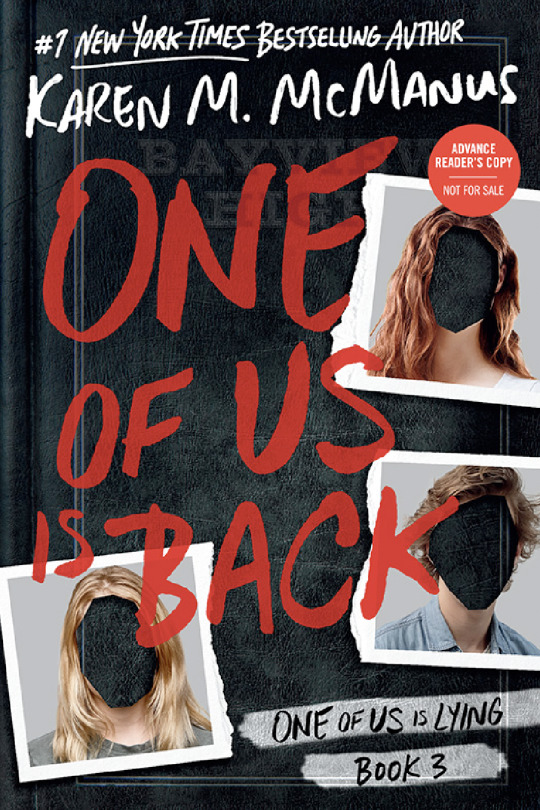
Rating: 4.5/5
Book Blurb: The global phenomenon returns with the third book in the One of Us Is Lying series, from #1 New York Times bestselling author Karen M. McManus. When someone from the Bayview Four’s past resurfaces, history begins to repeat itself—and the consequences are deadly.
The third time’s a charm.
It’s been almost two years since Simon died in detention, and the aftermath has been hard to shake. First the Bayview Four had to prove they weren’t killers. Then a new generation outwitted a vengeful copycat. Now the entire Bayview Crew is back home for the summer, and everyone is trying to move on.
Only, this is Bayview, and life is never that simple.
At first the mysterious billboard seems like a bad joke: Time for a new game, Bayview. But when a member of the Bayview Crew disappears, it’s clear this “game” is serious—and whoever’s in charge isn’t sharing the rules. Or maybe there aren’t any.
Bronwyn. Cooper. Addy. Nate. Maeve. Phoebe. Knox. Luis. Kris. Everyone’s a target. And now that someone unexpected has returned to Bayview, things could start getting deadly.
The thing is, Simon was right about secrets—they all come out eventually. And Bayview has a lot it’s still hiding.
Review:
The Bayview Crew is back again and there’s a new revenge game afoot, but this time its involving the entire group and they’ll have to figure out whats going on before more bodies begin to drop. In the third and finale book in the One of Us is Lying trilogy, it combines the original Bayview Four and now the crew from the second book. It’s been almost two years since Simon died and everyone’s home in Bayview for the summer... but then a mysterious billboard appears that says “Time for a new game, Bayview” and when members of the Bayview crew begin disappearing... they know the game has just begun.. it doesn’t help that Jake has been released from prison and is roaming around... and he definitely has a reason to target them. Bronwyn. Cooper. Addy. Nate. Maeve. Phoebe. Knox. Luis. Kris. All of them could be a target and with no clue as to what’s going on and why they’ll have to try and figure out who could be behind it and which one of them is going to be targeted. Told from the perspective of Addy, Nate, Phoebe, Simon, and Jake, this is going to be an unforgettable summer and a killer ending to the series. I have always enjoyed this series and was so happy to see my Bayview Four back again and grown up from the first book. I loved getting to see more Nate and Bronwyn relationship moments and getting to see just the original four friends and their friendship. I loved getting to see Addy cope with the aftermath of everything she went through and endured in her relationship with Jake and how she’s grown stronger and I was so proud of her. Honestly, it was a fun summer mystery and a sweet ending for the Bayview Crew!
*Thanks Netgalley and Random House Children's, Delacorte Press for sending me an arc in exchange for an honest review*
4 notes
·
View notes